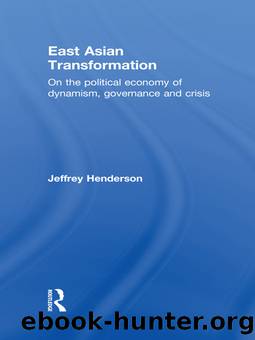East Asian Transformation by Henderson Jeffrey;

Author:Henderson, Jeffrey;
Language: eng
Format: epub
Publisher: Taylor & Francis Group
Published: 2011-08-15T00:00:00+00:00
Sustaining effective dirigisme: Taiwan and Singapore
With the economic demise of Korea, Thailand, Malaysia and Indonesia, and recession in Hong Kong, the question remains as to why Taiwan and Singapore survived the turmoil of the late 1990s relatively unscathed (with the exception of currency devaluations â about 20 per cent in Taiwan â and falls in stock market values). While in both cases, substantial foreign reserves (relative to GDP, among the highest in the world) and a willingness to use them to manipulate exchange rates, were contributing factors, it is likely that the sustained capacities of the respective states to control their domestic economies and to mediate between these and the international economy, carry much of the explanatory weight. In both cases effective developmental states were constructed (in Taiwan from the early 1950s, Singapore from the mid-1960s) as central components of what Castells (1992) calls, the âpolitical economy of survivalâ. While their strategies of state-orchestrated economic development were inevitably different â given their different histories as colonies, as social formations, their different gearings to the world economy and geo-politics, etc. â they managed to navigate and deflect the external and internal pressures that compromised state economic governance in Korea. While this is not the place to investigate the detail of the continuing institutional vitality of the Taiwanese and Singaporean states, in line with the tenor of the argument developed earlier, a number of significant issues can be highlighted.
In the first place, the question arises that if property market speculation was a central component of the crisis in the Southeast Asian economies and Hong Kong, why was it not such a debilitating feature, at least through to the 1990s, of economic development in Taiwan and Singapore, in spite of the fact that both of them were (and are) thoroughly imbricated in Overseas Chinese business networks? For Taiwan part of the answer seems to lie in the fact that the Government was committed to channelling savings (as a proportion of GDP, an enormous 40 per cent by the late 1980s) and investment into productive activities. In order to achieve this, tight control of finance capital was essential.
After its expulsion from China in 1949, the Kuomintang (KMT) Government, by then established in Taiwan, developed a healthy suspicion of the activities and interests of financial institutions. Rightly or wrongly, Chiang and the KMT placed part of the blame for their defeat by Maoâs Communists on the corruption and speculative activities of financial institutions which had undermined the economic base of their military effort and contributed to the loss of legitimacy of the Nationalist regime (Wade 1990, Seagrave 1985). Partly as a consequence of this experience and perception and partly because of the need to channel capital into productive activities, the dominant commercial and specialist banks (in the latter case for agriculture, industrial development, etc.) remained state-owned until the early 1990s and capital movements, through to and beyond the end of that decade, closely regulated.
As in Korea, but unlike the Southeast Asian countries, the Central Bank in Taiwan is legally committed to the promotion of economic development.
Download
This site does not store any files on its server. We only index and link to content provided by other sites. Please contact the content providers to delete copyright contents if any and email us, we'll remove relevant links or contents immediately.
Adding Value to Policy Analysis and Advice by Claudia Scott; Karen Baehler(449)
Sociological Perspectives of Health and Illness by Constantinos N. Phellas(444)
Race and American Political Development by unknow(439)
Human and Global Security : An Exploration of Terms by Peter Stoett(421)
American Government and Politics Today by Steffen W. Schmidt Mack C. Shelley Barbara A. Bardes(417)
Control Of Oil - Hardback by Kayal(402)
The Catholic Church and European State Formation, AD 1000-1500 by Jørgen Møller(354)
Entrepreneurship Education and Training: The Issue of Effectiveness by Colette Henry Frances Hill Claire Leitch(352)
The World According to China by Elizabeth C. Economy(339)
Materializing the Middle Passage by Jane Webster;(337)
Left Is Not Woke by Susan Neiman(326)
Theories of Counseling and Psychotherapy: A Case Approach by Nancy L. Murdock(310)
Turkey's Relations with the West and the Turkic Republics: The Rise and Fall of the Turkish Model by Idris Bal(307)
Cross-Cultural Child Development for Social Workers by Lena Robinson(301)
Japan's Ainu Minority in Tokyo by Mark K. Watson(293)
Advances in Child Development and Behavior, Volume 37 by Patricia J. Bauer(293)
Laboratory Life by Bruno Latour(292)
Beyond Service: State Workers, Public Policy, and the Prospects for Democratic Administration by Greg McElligott(280)
The Oxford Handbook of Museum Archaeology by Stevenson Alice;(273)
